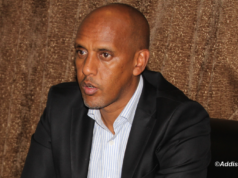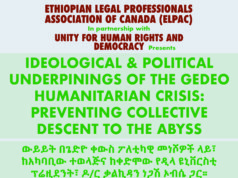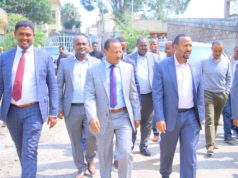A CALL FROM OBANG AND THE SMNE: RECLAIMING AN ETHIOPIA FOR ALL ETHIOPIANS
It is time to reclaim Ethiopia for all of us.
I, for one, will not stand by as the country we call home is tossed to and fro in the ethnic or sectarian battlefield of the ambitions and interests of a few vying groups. The competition— rather than cooperation—continues until whomever comes out on top takes over to dominate in a recycling of dysfunction that has been repeated again and again in Ethiopia.
Once in power, that ethnic or sectarian group suddenly wants to claim leadership over the same Ethiopia they had rejected and over the same Ethiopian people who had been forgotten or devalued during their own struggle for power.
Why do we, the people of Ethiopia, continue to repeat the same mistakes— repeatedly? Is it habit, tradition, fear, deception, intimidation, ignorance, selfishness or ambition that drives Ethiopians to continually form their own sectarian huddles, perpetually leaving others out, including those they claim to represent? 
As always, it distracts attention away from the most important issues and changes the focus to the actions and reactions of different stakeholders. In the process, the nation as a whole is forgotten. I assert, it is time to learn from our mistakes. It is time to use this conflict to transform our nation and future rather than to allow ourselves to be set-up for failure once again.
The Solidarity Movement for a New Ethiopia (SMNE) was formed in 2008 for exactly this reason. There was a lack of inclusion and a disregard for the rights, security and well being of all. Instead, all of us were fighting for ourselves in our own season of need. When this became clear, the SMNE chose to transition from an ethnic-based worldview to one that embraced all Ethiopians as our fellow people, all created in the image of God and of value.
We believed by caring about our neighbors as we cared about our own concerns— as individuals, communities or regions—that we would create the best foundation to achieve the hopes and dreams of Ethiopians from every corner of the country. Since that time, we have been talking about this and acting on it to the best of our ability; yet, we are now witnessing a resurgence in tribal aspirations at the cost of sacrificing bigger and more lasting goals for our country. I cannot be silent.
Ethiopia is the land we all call home and it is a good land. It has great beauty and bountiful resources, but in this land there now live nearly a hundred million people, most of them vulnerable to the crisis before us. We cannot ignore their needs.
How many Ethiopians still believe that ethnic-based political movements, struggles or ambitions will improve the lives of those outside one’s own collective group? I believe the majority do not; instead, they have seen the tendency among such group to exploit and repress others to their own advantage. We need moral leadership and vision for our country to break this self-destructive cycle without destroying the country in the process.
To reclaim Ethiopia for all, we must reclaim the humanity of others. Are we strong enough to stand against the pressure of tribe when our own ethnic groups condemn us for affirming the rights and value of others outside our own group? This kind of pressure is being strongly exerted within many ethnic groups, despite the fact that I hear from many of these same Ethiopians that they object to tribal politics. Instead, they want to see an Ethiopia where the rights and worth of all its people are upheld; yet, when they are among their own ethnic groups, they are afraid of saying it publicly for fear of condemnation and ostracism.
We must each other to be bold or those intimidating us will win, but in doing so, we all will lose. We also might be pleasantly surprised by the increasing numbers of people who are ready to discard ethnic-based politics, like the TPLF experiment of ethnic federalism, as a destructive and failed policy.
In light of this, how do we form a common vision for all Ethiopians in the face of extreme peer, political or tribal pressure to follow the party line rather than one’s conscience or logic? The problem is worsened during times of fear when people return to their ethnic-based enclaves for security, acceptance, comfort and protection, thinking that their ethnic groups are the best defense against others. It is especially evident when new groups form in a fear-based or competitive reaction to another group’s loudly proclaimed ethnic agenda. Such actions contribute to instability because no one owns the country or stands up for the broader interests of all the people.
Why is it that Ethiopians, who have lived together for millenniums, continue in this day of age to retreat to narrow agendas when it is a common vision that is most urgently needed to protect their own interests and those of their descendants? Instead, we need an alternative path to a better future for all Ethiopians. How do we reclaim Ethiopia as our shared home? How do we institutionalize the effort to improve the security, wellbeing and justice of all our citizens? What if the interests of these Ethiopians were defended across lines of ethnicity, viewpoint, socio-economic class, disability, age, gender, associations, education, religious belief or regional background? To achieve this will require an organized strategy for development and implementation.
The lack of international support and the lack of interest by the non-involved majority of Ethiopians in this struggle points to our failure to form a non-tribal, inclusive and viable alternative to the TPLF/EPRDF. Until they believe something better can be achieved, their lack of involvement or support will most likely continue. It is time to build such a foundation; not to please foreigners, but to establish a stronger, more institutionalized infrastructure for the genuine transformation of Ethiopia.
This is why the SMNE will move from its primary work in advocacy and activism to a different stage where the primary goal will be to form an alternative platform. This platform would give direction in the development of better, more just and more inclusive governance in the future that would not be based on ethnicity or narrow sectarianism, but on principles of putting humanity before ethnicity or other differences; and secondly, caring about the well being of all Ethiopians, not only because it is right, but also because no one will be free until all are free.
May God help us to avoid repeating our mistakes that have led to such suffering, death and pain because our leaders, and sometimes ourselves as well, have failed to embrace the humanity of all of us. We should not be rivals nor should we be held captive by past grievances; but instead, we must seek healing, reconciliation and justice as a path to genuine unity with our fellow Ethiopian brothers and sisters. May God awaken our hearts for such an Ethiopia. Long Live Ethiopia!
=======================
For more information, contact Obang Metho, Executive Director of the SMNE. Email: Obang@solidaritymovement.org

























